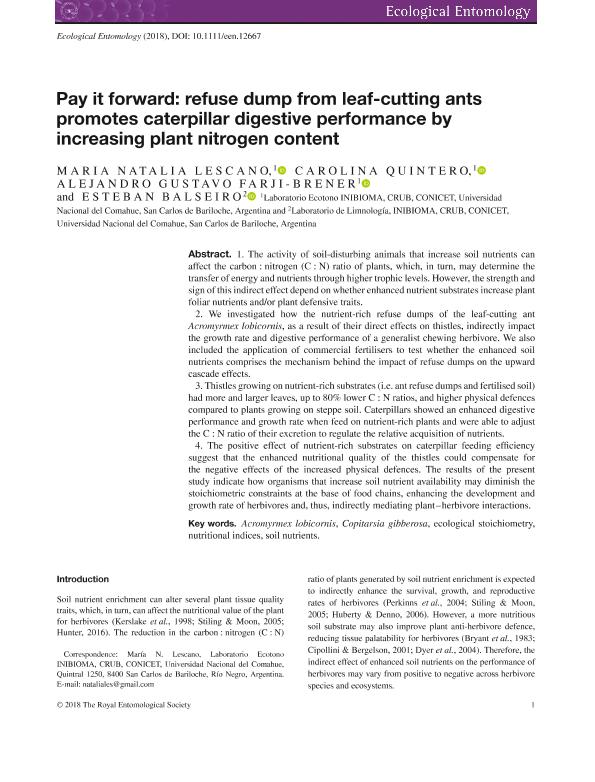Mostrar el registro sencillo del ítem
dc.contributor.author
Lescano, María Natalia

dc.contributor.author
Quintero, Carolina

dc.contributor.author
Farji Brener, Alejandro Gustavo

dc.contributor.author
Balseiro, Esteban Gabriel

dc.date.available
2020-01-09T19:12:55Z
dc.date.issued
2019-02-09
dc.identifier.citation
Lescano, María Natalia; Quintero, Carolina; Farji Brener, Alejandro Gustavo; Balseiro, Esteban Gabriel; Pay it forward: refuse dump from leaf-cutting ants promotes caterpillar digestive performance by increasing plant nitrogen content; Wiley Blackwell Publishing, Inc; Ecological Entomology; 44; 1; 9-2-2019; 40-49
dc.identifier.issn
0307-6946
dc.identifier.uri
http://hdl.handle.net/11336/94181
dc.description.abstract
1. The activity of soil-disturbing animals that increase soil nutrients can affect the carbon : nitrogen (C : N) ratio of plants, which, in turn, may determine the transfer of energy and nutrients through higher trophic levels. However, the strength and sign of this indirect effect depend on whether enhanced nutrient substrates increase plant foliar nutrients and/or plant defensive traits. 2. We investigated how the nutrient-rich refuse dumps of the leaf-cutting ant Acromyrmex lobicornis, as a result of their direct effects on thistles, indirectly impact the growth rate and digestive performance of a generalist chewing herbivore. We also included the application of commercial fertilisers to test whether the enhanced soil nutrients comprises the mechanism behind the impact of refuse dumps on the upward cascade effects. 3. Thistles growing on nutrient-rich substrates (i.e. ant refuse dumps and fertilised soil) had more and larger leaves, up to 80% lower C : N ratios, and higher physical defences compared to plants growing on steppe soil. Caterpillars showed an enhanced digestive performance and growth rate when feed on nutrient-rich plants and were able to adjust the C : N ratio of their excretion to regulate the relative acquisition of nutrients. 4. The positive effect of nutrient-rich substrates on caterpillar feeding efficiency suggest that the enhanced nutritional quality of the thistles could compensate for the negative effects of the increased physical defences. The results of the present study indicate how organisms that increase soil nutrient availability may diminish the stoichiometric constraints at the base of food chains, enhancing the development and growth rate of herbivores and, thus, indirectly mediating plant–herbivore interactions.
dc.format
application/pdf
dc.language.iso
eng
dc.publisher
Wiley Blackwell Publishing, Inc

dc.rights
info:eu-repo/semantics/openAccess
dc.rights.uri
https://creativecommons.org/licenses/by-nc-sa/2.5/ar/
dc.subject
ACROMYRMEX LOBICORNIS
dc.subject
COPITARSIA GIBBEROSA
dc.subject
ECOLOGICAL STOICHIOMETRY
dc.subject
NUTRITIONAL INDICES
dc.subject
SOIL NUTRIENTS
dc.subject.classification
Ecología

dc.subject.classification
Ciencias Biológicas

dc.subject.classification
CIENCIAS NATURALES Y EXACTAS

dc.title
Pay it forward: refuse dump from leaf-cutting ants promotes caterpillar digestive performance by increasing plant nitrogen content
dc.type
info:eu-repo/semantics/article
dc.type
info:ar-repo/semantics/artículo
dc.type
info:eu-repo/semantics/publishedVersion
dc.date.updated
2019-10-10T13:58:10Z
dc.journal.volume
44
dc.journal.number
1
dc.journal.pagination
40-49
dc.journal.pais
Reino Unido

dc.journal.ciudad
Londres
dc.description.fil
Fil: Lescano, María Natalia. Consejo Nacional de Investigaciones Científicas y Técnicas. Centro Científico Tecnológico Conicet - Patagonia Norte. Instituto de Investigaciones en Biodiversidad y Medioambiente. Universidad Nacional del Comahue. Centro Regional Universidad Bariloche. Instituto de Investigaciones en Biodiversidad y Medioambiente; Argentina. Universidad Nacional del Comahue. Centro Regional Universitario Bariloche. Laboratorio de Ecotono; Argentina
dc.description.fil
Fil: Quintero, Carolina. Consejo Nacional de Investigaciones Científicas y Técnicas. Centro Científico Tecnológico Conicet - Patagonia Norte. Instituto de Investigaciones en Biodiversidad y Medioambiente. Universidad Nacional del Comahue. Centro Regional Universidad Bariloche. Instituto de Investigaciones en Biodiversidad y Medioambiente; Argentina. Universidad Nacional del Comahue. Centro Regional Universitario Bariloche. Laboratorio de Ecotono; Argentina
dc.description.fil
Fil: Farji Brener, Alejandro Gustavo. Consejo Nacional de Investigaciones Científicas y Técnicas. Centro Científico Tecnológico Conicet - Patagonia Norte. Instituto de Investigaciones en Biodiversidad y Medioambiente. Universidad Nacional del Comahue. Centro Regional Universidad Bariloche. Instituto de Investigaciones en Biodiversidad y Medioambiente; Argentina. Universidad Nacional del Comahue. Centro Regional Universitario Bariloche. Laboratorio de Ecotono; Argentina
dc.description.fil
Fil: Balseiro, Esteban Gabriel. Consejo Nacional de Investigaciones Científicas y Técnicas. Centro Científico Tecnológico Conicet - Patagonia Norte. Instituto de Investigaciones en Biodiversidad y Medioambiente. Universidad Nacional del Comahue. Centro Regional Universidad Bariloche. Instituto de Investigaciones en Biodiversidad y Medioambiente; Argentina. Universidad Nacional del Comahue. Centro Regional Universitario Bariloche. Laboratorio de Limnología; Argentina
dc.journal.title
Ecological Entomology

dc.relation.alternativeid
info:eu-repo/semantics/altIdentifier/url/https://onlinelibrary.wiley.com/doi/full/10.1111/een.12667
dc.relation.alternativeid
info:eu-repo/semantics/altIdentifier/doi/http://dx.doi.org/10.1111/een.12667
Archivos asociados
